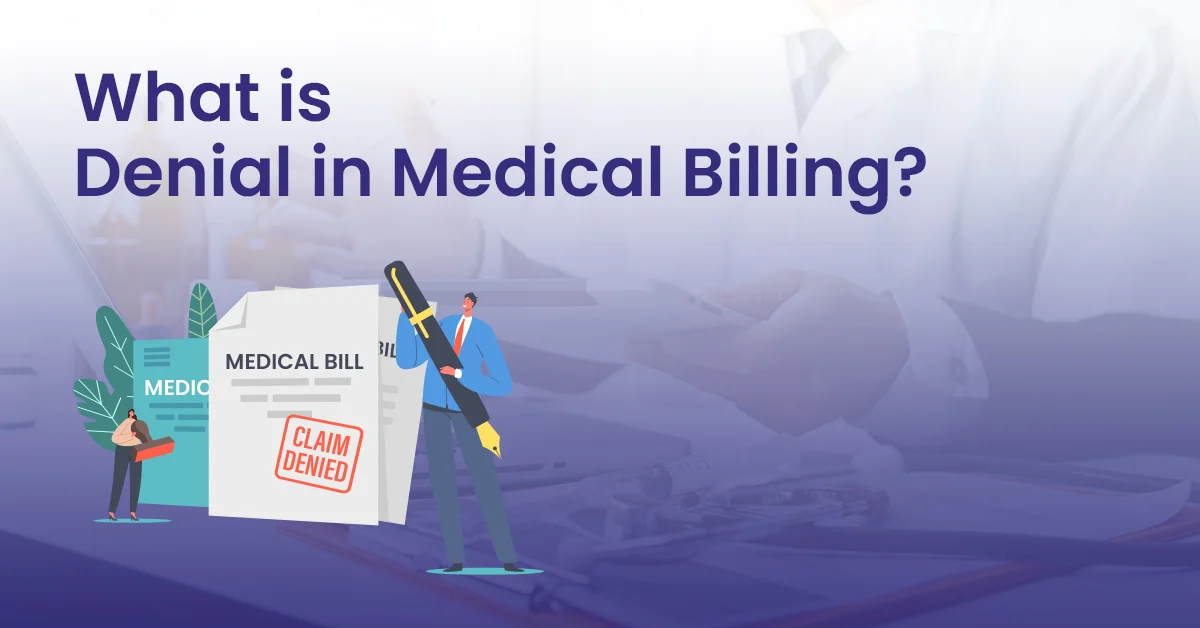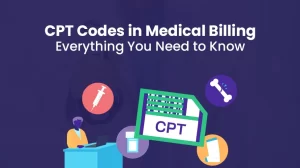If you are looking for the answer to the question: “What is Denial in Medical Billing”? And why it’s happened. The explanation available here is to guide you about it. Denial in medical billing is a refusal by a health insurance company to pay for services or products it has agreed to cover. Denials can happen for various reasons but are most often the result of an incorrect bill or claim. When a health insurance company denies a claim, it can leave the provider responsible for the full cost of the services provided. Enforcement usually occurs because an insurer wants to return some of the money paid to the provider. Payment may have been made through a healthcare financial intermediary, such as an insurance company or Medicare.
A bill may also be denied if the professionals providing solutions are not medically appropriate. Denial management services in medical billing extend beyond medical care services. Denial of a health insurance claim can include insurance providers that won’t pay for things like devices, diagnostic tests, services that are not covered by the insurance, products that are not covered by the insurance, screening at a medical facility, or if the provider who receives the bill is not licensed, that aren’t licensed by a licensed entity. In this article, we’ll discuss what is denial in medical billing, why it happens and what providers can do when they experience a denial.
What Are Most Common Denial Issues in Medical Billing?
Denial in medical billing is when an insurance company decides not to pay for services or products they have agreed to cover. This could occur due to various factors. The services or products do not meet the insurance company’s policy or guidelines. The provider is overcharging the insurance company. These denials are categorized as soft and hard; some can be re-send, and others cannot. This article will go over the different types of medical claim denials and demonstrate how to avoid them. We will also provide tips on appealing a denied medical claim.
Common Categories of Denial in Medical Billing
Medical claim denials are a constant source of annoyance for hospitals and other healthcare providers, reducing revenue, cash flow, and operational efficiency. Certainly, we can avoid many denied claims with the right expertise and processes. While it is difficult to avoid denials completely, improving your understanding of and preparation for the most common types can help reduce the chance of them occurring in the first place and significantly impact your bottom line. This blog will look at common medical claim denials and how to avoid them.
Eligibility Denials
Eligibility-related denials frequently result from the patient’s information not being obtained during preregistration or when they are not present at registration. These denials can also result from coverage alteration during the patient’s hospitalization, which is especially common in patients who stay for a month or more. The most effective way to avoid these healthcare denials is to collect the necessary patient information ahead of time, but this will not prevent all eligibility denials. Rerunning eligibility checks before billing the claim is another option, as is using a coverage discovery tool to search for active coverage on a patient. Finally, when it comes to eligibility-related denials, it is worthwhile to employ every strategy available to prevent or reduce them.
Invalid data-related denials
Claims that are missing or invalid Data denials are typically considered soft denials, meaning the claim can usually be fixed and resend for reimbursement. These healthcare denials occur when submitted data fails the payer’s criteria, indicating that vital data is missing. Also, secondary billing claims may indicate incorrect or missing data in the remittance advice data provided on that claim. In most cases, you can avoid these denials by integrating a full edits collection into your billing or denial management software, which prevents claims from being submitted with missing or incorrect data.
Authorization Related Denials
Most authorization-related denials result in hard denials. They cannot be repaired, and no patient payments can be recovered. This scenario occurs when a required authorization cannot be obtained prior to service or an invalid authorization number is included on the claim. Prior authorization may be obtained, but insurance may still deny the claim due to an eligibility issue, such as the patient’s coverage changing or expiring after receiving the authorization but before it can be used. Payers frequently assign time limits or expiration dates to authorization numbers, which, if not used within the given time, result in a denial.
Non-Covered Service Denials
Non-covered service denials are always hard, so you’re unlikely to recover any money from these claims. When these types of healthcare denials occur, it is frequently due to the payer’s plan not covering the provided service. This denial can also occur when a patient’s stay exceeds the maximum number of days allowed for a particular service. Furthermore, a non-covered service denial could be linked to noncompliance with managed care plan restrictions. Although you may be able to provide documentation for these types of claims through an appeal.
Inadequate documentation denials
Inadequate documentation denials are typically soft denials, and you will most likely be able to correct any errors and resubmit the claim. These healthcare denials are due to a lack of documentation; either the requested documentation cannot be provided at all, or it can be provided but not received. The documentation really does not always turn up within the time frame specifically mentioned by the payer. In other cases, inadequate or insufficient information cannot be received, and the claims are not denied. However, appealing these claims may be possible by completing and submitting extra details as required by the payer.
Reasons for Denial in Medical Billing
Denial happens for various reasons, and it is possible to fight for claims that get denied, depending on the nature of the denied claim. The provider may encounter a denial due to an error in the claims billing code, specifically by forgetting to use a specific service code, failing to document service, billing for an impossible service, billing in the wrong code, improper usage of a service, or failure to group multiple services under the same service code. Other denied reasons could include multiple billed procedures on the same day, billing for services not authorized, unintentional errors in billing, double billing, billing charges that are higher than the charges authorized, improper service charges, failing to include documentation (demand, modifier form, or reason code), or failure to follow coding rules.
When a patient’s insurance application is rejected, not only does your cash flow suffer, but your relationship with the patient suffers as well. Some claim denials can be successfully argued, but even if they cannot, they can temporarily jeopardize claim status, which both your practice and your patient would prefer to avoid. Recognizing the most likely reasons for claim denials is essential for preventing them. The insurers with whom your practice works may provide an operating system to prevent claim rejection (claims that are not handled due to mistakes) and claim denials (claims that are considered but payment is denied), so you must be aware of and use these tools.
When a bill is denied, some providers try to negotiate with their rates, some email their guide to determine understanding and basic billing errors, and others may appeal directly to the medical insurance company and complain. Denials can be fought by contacting the insurance company directly or filing an appeal with the insurance company’s independent provider reviewer (IPR). In most states, at least one review organization reviews insurance company denials. The IPR can help the provider deal with insurance company denials. When filing an appeal, the provider’s challenge must meet certain hurdles. You get insight into what is denial in medical billing. It’s also important to know about its reasons. Here are the most important reasons:
Lack of Prior Authorization
The inability to get pre-certification (or pre-authorization, or whatever term the specific insurer uses) can charge your practitioners and your patients’ money while significantly lowering the quality of care. Recognizing which insurers require pre-authorization and for what purpose is extremely crucial. Your medical billing software can help in some cases by noting specific procedures and insurers, so you understand what steps to take. Furthermore, it is preferable to obtain pre-authorization for a procedure that will not be performed than to perform it and then seek retroactive authorization.
Errors on Claim Forms
Claim rejections (which do not typically result in payment denials) are frequently the result of simple accounting errors, such as a patient’s name being spelled incorrectly or digits in a Customer id being overlaid. These are easy solutions, but they extend the cash flow, restricting overhead costs. Claims can be denied if the diagnosis and procedure codes are incorrect. Whereas these circumstances are often effective in challenging, protection is always recommendable. Well-trained coders and the use of robust cloud-based EHR are essential.
Late Claim Submission
Different insurers have different deadlines for submitting claims and various guidelines regarding what you can do if you forget a deadline. In some cases, a telephone conversation can probably be sufficient, but in others, additional paperwork can be required. You may be able to use your medical billing software to notify you of claim submission deadlines and the steps to take if you forget one. To keep your revenue cycle moving, it is better to submit claims as soon as possible after services are rendered.
Inadequate Medical Necessity
An insurer may refuse to pay for an operation it believes is medically unnecessary. These can be difficult circumstances for all concerned parties, but they may be easily preventable. In any case, in which medical necessity is unclear, effective communication among healthcare professionals, medical billing staff, insurance providers, and patients is critical to ensuring that almost everyone tends to make intelligent decisions. Whenever a claim is denied based on a medical necessity, healthcare practice may be forced to accumulate the cost of the treatment or retrieve the complete payment from the patient.
Tips to Avoid Denials in Medical Billing
Along with the information on what is denial in medical billing, it’s important to know tips to reduce it. One of the most serious concerns for physicians and other medical practitioners is the denial of medical claims. BellMedEx healthcare denial management services are intended to sieve through your data and identify the root cause of all denials. Our team understands, keeps track of, and reports denials.
Denial Management Solutions
Healthcare organizations must understand, quantify, and address the underlying causes of their current claim denials and establish an efficient denial management process. The following are some of the possible solutions we offer:
Identifying the Root Causes of Denial
The first step is to pinpoint the basic reason for the claim’s denial. When adjudicated claims are returned unpaid, the payer will provide an error code and the reason for the remittance. Understanding the common and hidden causes of constant denials may necessitate thoroughly examining your billing procedures and management. After this is completed, our staff at BellMedex find exactly where to look and fix the dilemma.
Classify Denials
Following identifying the denial flow rate and reasons, we can categorize the denials so that they can be monitored and routed to the appropriate department for resolution. Sorting and analyzing denials by category will aid in determining opportunities to revise processes, optimize workflows, or retrain employees, physicians, and healthcare professionals.
Creating a Tracking Mechanism
After categorizing the reasons for denial, we create a tracking mechanism that allows us to obtain the following information easily –
- Denial types affecting the business
- Payers influencing the organization in terms of denied claims cash
- Denied claims that have the greatest impact on medical practices.
BellMedEx Denial-Reduction Strategies
Every business must improve the medical billing process and reduce denials. To reduce the number of claim denials, BellMedEx employs the following strategies:
Verify Patient Eligibility
Our employees are directed to collect data about each patient’s health insurance coverage and entitlement eligibility. Our practice management software can verify patients’ eligibility and benefits even before they are enrolled in the hospitals. To get information about what is a practice management, read it further.
Procure Prior authorization
We develop a procedure to ensure that your scheduling algorithms receive prior authorization for all required services. We scrutinize the prior authorization specifications for the most commonly ordered in-office services during a clinical encounter so that your employee understands when to obtain that authorization before delivering a service.
Reduce Coding Mistakes
There can certainly be more denials due to increased coding errors. We undertake the essential steps to reduce coding errors, pinpoint services provided frequently by your practitioner, and then seek expert advice regarding how to code those solutions. Before submitting each claim, BellMedex coding specialists review and verify the codes.
Ascertain Medical Necessity
Insurance companies may refuse to acknowledge a claim if the provided diagnosis code does not support the need for the customer experience. To avoid this situation, we use electronic Health Records software that enables users to create charges for coverage determinations. We also obtain medical necessity guidelines from all of your insurance companies. Provide customers with a highly centralized, on-demand perspective of all claim denials and re-submissions elements.
- Manage all-payer claim denials.
- Focus on providing key trending reports to assess the effectiveness of operational efficiencies.
- Provide HIPAA-compliant technological security and privacy compliance.
- Focus on providing high-quality services at reasonable prices promptly.
Why should you get the services of BellMedEx for Denial Management Services?
Understanding the various causes of claim denials can boost long-term efficiency and significantly reduce revenue loss. BellMedex cloud-based denial management solutions in medical billing applications can help you analyze processes more efficiently, revealing opportunities for effective denial prevention. You can count on us to:
- Give all customers a centralized, on-demand perspective for overseeing all aspects of claim denials and re-submissions.
- Manage all-payer claim denials.
- Concentrate on delivering key trending documentation to evaluate the efficacy of productivity improvements.
- Provide complete HIPAA technological security and privacy compliance.
- Focus on providing high-quality services at reasonable prices on time.
BellMedex Solutions expedites the repair and re-submission of denied claims for your organization’s cross-functional teams. An intelligent workflow engine implements consumer functionality to efficiently distribute denied claims that must be resubmitted to the relevant department and specific team members while keeping a complete record of all claims’ actions. For over a decade, BellMedex Solutions has been providing medical denial management services to businesses in the United States at very affordable pricing. Health Coverage Claims Processing, physician accreditation, patient demographic entry, and other services are also accessible.
The BellMedEx denial management team is digging into this one.
- Take a glance at the reason for each denied claim.
- Concentrate on resolving the problem.
- Send the request to the insurance company again.
- File any required appeals.
We understand that each denial case differs. We correct invalid or incorrect medical codes, focus on providing supporting patient records, appeal any prior authorization denials, comprehend any genuine denial cases to pass responsibility to patients, and effectively follow up. Before re-submission, we re-validate all clinical information.
Medical billing and coding services is a critical in the healthcare industry. The denial of medical claims is a common problem that healthcare providers face. This might be caused by various factors, including inaccurate coding, a complete absence of documentary evidence, or inadequate data.
The claim denials are attributed to the correction of inpatient medical coding errors. Many medical billing denials can be avoided. Your practice could easily be among those who successfully manage claims by conducting thorough security checks, collecting accurate patient data, and relying on one of the top monitoring EHR software. Our Healthcare Solutions provides various claim-related services to assist your practice in avoiding billing denials.
Conclusion
This article is a complete guide on what is denial in medical billing. It’s a refusal by a health insurance company to pay for services or products it has agreed to cover because of claims errors. Denials can happen for various reasons, but they are often related to incorrect billings. A health insurance company will deny a claim when they think the final amount billed is incorrect, but they will also deny it if they think the bill is fraudulent.
A medical billing company can help physicians in making their bills paid on time using the effective strategies to prevent denials. If you are looking for a reputable company, we are here to help.




